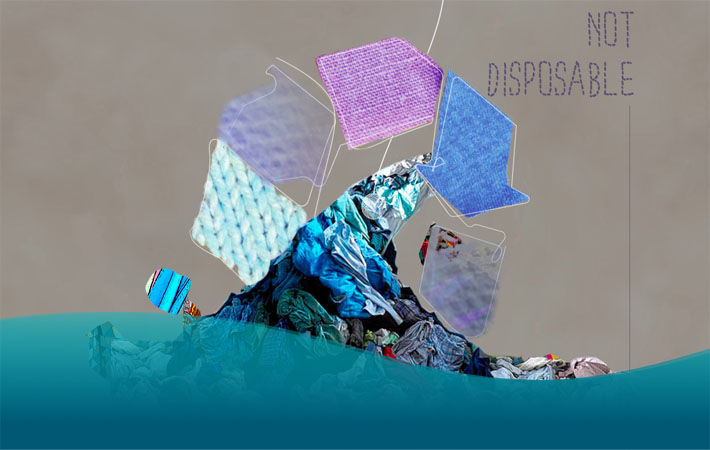Interviews
EC funds campaign on disastrous impact of fast fashion
19 Apr '21
5 min read

Pic: EIN Presswire
With clothes consumption increasing by 60 per cent in only 15 years, a Pan-European campaign - Beyond Your Clothes – to raise awareness on the disastrous environmental consequences of the fast fashion industry and its social impact has been launched. The campaign is part of the “Smart Textile and Garments” project, funded by the European Commission.
The “Smart Textile and Garments” project is being implemented by Sequa.
Amidst Covid-19, an unprecedent level of unsold garments are being burnt or destined for landfills. Some countries are now considering exporting to stop the accumulation of textile waste.
“It is in this critical context that the ‘Beyond Your Clothes campaign’ has been created, consisting of an innovative website (parallax) which provides, in an interactive and ludic approach, different layers of information to a wide audience, from fast fashion consumers to sustainably active individuals,” said 360 Agency Berlin, which has created the campaign.
To maximise reach and educate consumers on the potential ecological implications of fast fashion, 360 Agency Berlin created multiple digital assets to build the campaign effectively. With informative text and studies provided by Greenpeace, ILO, and UNICEF, the content of the immersive website www.beyondyourclothes.com comprises several layers of understanding to appeal to readers with varying levels of awareness on the impact of their consumption, and to transform them into well-conscious and empowered consumers.
The provided facts are supported by studies shared by Greenpeace. The inclusive and informative content is available on www.beyondyourclothes.com. The campaign is being supported by a guerilla activation and a social media presence while the most engaged sustainable influencers around the globe are relaying the initiative.
There are various sections on sustainability, including how to handle clothes with care to make them last longer, how to look for less energy-intensive fabrics, and demonstrating why clothes are not disposable. To further enhance the message with imagery, the co-director of the award-winning documentary RiverBlue, Roger Williams, allowed 360 Agency Berlin to reuse the video material that took the crew three years to shoot. Despite unattainable authorisations and arduous logistics, they succeeded in making a beautiful, compelling, and complete documentary on the world’s most polluted waterways and areas of the global clothing manufacturing industry - China, Bangladesh, India, and Indonesia.
In parallel, 360 Agency Berlin took months to gather the most engaged influencers around the globe who have shown interest in the vital sustainability aspect of the campaign. To assess their sustainable engagement, 360 Agency Berlin mentioned that no funds were involved in relaying this campaign, eliminating influencers having only a pecuniary motivation. The most sustainably engaged influencers have been invited to join a platform to meet and exchange about sustainability and relay the entire non-profit initiative, as well as share between themselves tips and information from their different locations around the world - Canada, India, France, Netherlands, UK, US and Switzerland.
“It is essential to mirror what truly stands behind our clothes consumption and to experience that small changes can have some great impacts,” said Andrea Henao, founder of 360 Agency Berlin.
Consuming habits have evolved over the years, with brands creating up to 52 different collections per year compared to just 2 seasons a few decades ago. Garments are worn only once, becoming a disposable product. This purchase behaviour has brought catastrophic consequences to environment. The clothing and textile industry is currently the second largest polluter in the world.
Some 2 billion tee-shirts are produced per year, knowing that one single cotton tee-shirt requires 2700 litres of water (the equivalent of 900 days of drinking water for a single person). In 2017, textile purchases in the EU generated about 654 kilograms of CO2 emissions per person according to the European Environment Agency (EEA).
The social impact of the textile and garment industry is also colossal. The global outsourcing of the textile and clothing industry has gone hand-in-hand with an almost complete erosion of the labour and social rights of workers. The ILO estimates that 170 million are engaged in child labour, with many being part of the textiles and garments production chains to satisfy the increasing demand.
The EU’s Strategy for Sustainable Textiles aims to reduce the impact of fast fashion on the environment, adopting a new Circular Economy Action Plan. It includes the EU’s new comprehensive Strategy for Textiles with proposals to put in place a new sustainable framework, alongside developing eco-design measures to ensure that textile products are fit for circularity, as well as establishing the uptake of secondary raw materials, tackling the presence of hazardous chemicals, and empowering business and private consumers to choose sustainable textiles and get easy access to reuse services. The EU aspires to achieve high levels of separate textile waste collection by 2025.
The ‘Strategy for Textiles’ is part of a wider approach called the ‘European Green Deal’, which identifies textiles as a priority sector for the EU to pave the way towards a carbon neutral and circular economy.
The “Smart Textile and Garments” project is being implemented by Sequa.
Amidst Covid-19, an unprecedent level of unsold garments are being burnt or destined for landfills. Some countries are now considering exporting to stop the accumulation of textile waste.
“It is in this critical context that the ‘Beyond Your Clothes campaign’ has been created, consisting of an innovative website (parallax) which provides, in an interactive and ludic approach, different layers of information to a wide audience, from fast fashion consumers to sustainably active individuals,” said 360 Agency Berlin, which has created the campaign.
To maximise reach and educate consumers on the potential ecological implications of fast fashion, 360 Agency Berlin created multiple digital assets to build the campaign effectively. With informative text and studies provided by Greenpeace, ILO, and UNICEF, the content of the immersive website www.beyondyourclothes.com comprises several layers of understanding to appeal to readers with varying levels of awareness on the impact of their consumption, and to transform them into well-conscious and empowered consumers.
The provided facts are supported by studies shared by Greenpeace. The inclusive and informative content is available on www.beyondyourclothes.com. The campaign is being supported by a guerilla activation and a social media presence while the most engaged sustainable influencers around the globe are relaying the initiative.
There are various sections on sustainability, including how to handle clothes with care to make them last longer, how to look for less energy-intensive fabrics, and demonstrating why clothes are not disposable. To further enhance the message with imagery, the co-director of the award-winning documentary RiverBlue, Roger Williams, allowed 360 Agency Berlin to reuse the video material that took the crew three years to shoot. Despite unattainable authorisations and arduous logistics, they succeeded in making a beautiful, compelling, and complete documentary on the world’s most polluted waterways and areas of the global clothing manufacturing industry - China, Bangladesh, India, and Indonesia.
In parallel, 360 Agency Berlin took months to gather the most engaged influencers around the globe who have shown interest in the vital sustainability aspect of the campaign. To assess their sustainable engagement, 360 Agency Berlin mentioned that no funds were involved in relaying this campaign, eliminating influencers having only a pecuniary motivation. The most sustainably engaged influencers have been invited to join a platform to meet and exchange about sustainability and relay the entire non-profit initiative, as well as share between themselves tips and information from their different locations around the world - Canada, India, France, Netherlands, UK, US and Switzerland.
“It is essential to mirror what truly stands behind our clothes consumption and to experience that small changes can have some great impacts,” said Andrea Henao, founder of 360 Agency Berlin.
Consuming habits have evolved over the years, with brands creating up to 52 different collections per year compared to just 2 seasons a few decades ago. Garments are worn only once, becoming a disposable product. This purchase behaviour has brought catastrophic consequences to environment. The clothing and textile industry is currently the second largest polluter in the world.
Some 2 billion tee-shirts are produced per year, knowing that one single cotton tee-shirt requires 2700 litres of water (the equivalent of 900 days of drinking water for a single person). In 2017, textile purchases in the EU generated about 654 kilograms of CO2 emissions per person according to the European Environment Agency (EEA).
The social impact of the textile and garment industry is also colossal. The global outsourcing of the textile and clothing industry has gone hand-in-hand with an almost complete erosion of the labour and social rights of workers. The ILO estimates that 170 million are engaged in child labour, with many being part of the textiles and garments production chains to satisfy the increasing demand.
The EU’s Strategy for Sustainable Textiles aims to reduce the impact of fast fashion on the environment, adopting a new Circular Economy Action Plan. It includes the EU’s new comprehensive Strategy for Textiles with proposals to put in place a new sustainable framework, alongside developing eco-design measures to ensure that textile products are fit for circularity, as well as establishing the uptake of secondary raw materials, tackling the presence of hazardous chemicals, and empowering business and private consumers to choose sustainable textiles and get easy access to reuse services. The EU aspires to achieve high levels of separate textile waste collection by 2025.
The ‘Strategy for Textiles’ is part of a wider approach called the ‘European Green Deal’, which identifies textiles as a priority sector for the EU to pave the way towards a carbon neutral and circular economy.
Fibre2Fashion News Desk (SV)
Popular News
Leave your Comments
Kimberly Morgan and Rik Veltman
K3 Business Technology Group PLC
Amritha Ram
Brand - KH House of Khaddar
Dr. Sameer Sood
National Institute of Fashion Technology
































-Ltd..jpg?tr=w-120,h-60,c-at_max,cm-pad_resize,bg-ffffff)





.jpg?tr=w-120,h-60,c-at_max,cm-pad_resize,bg-ffffff)
.jpg?tr=w-120,h-60,c-at_max,cm-pad_resize,bg-ffffff)






